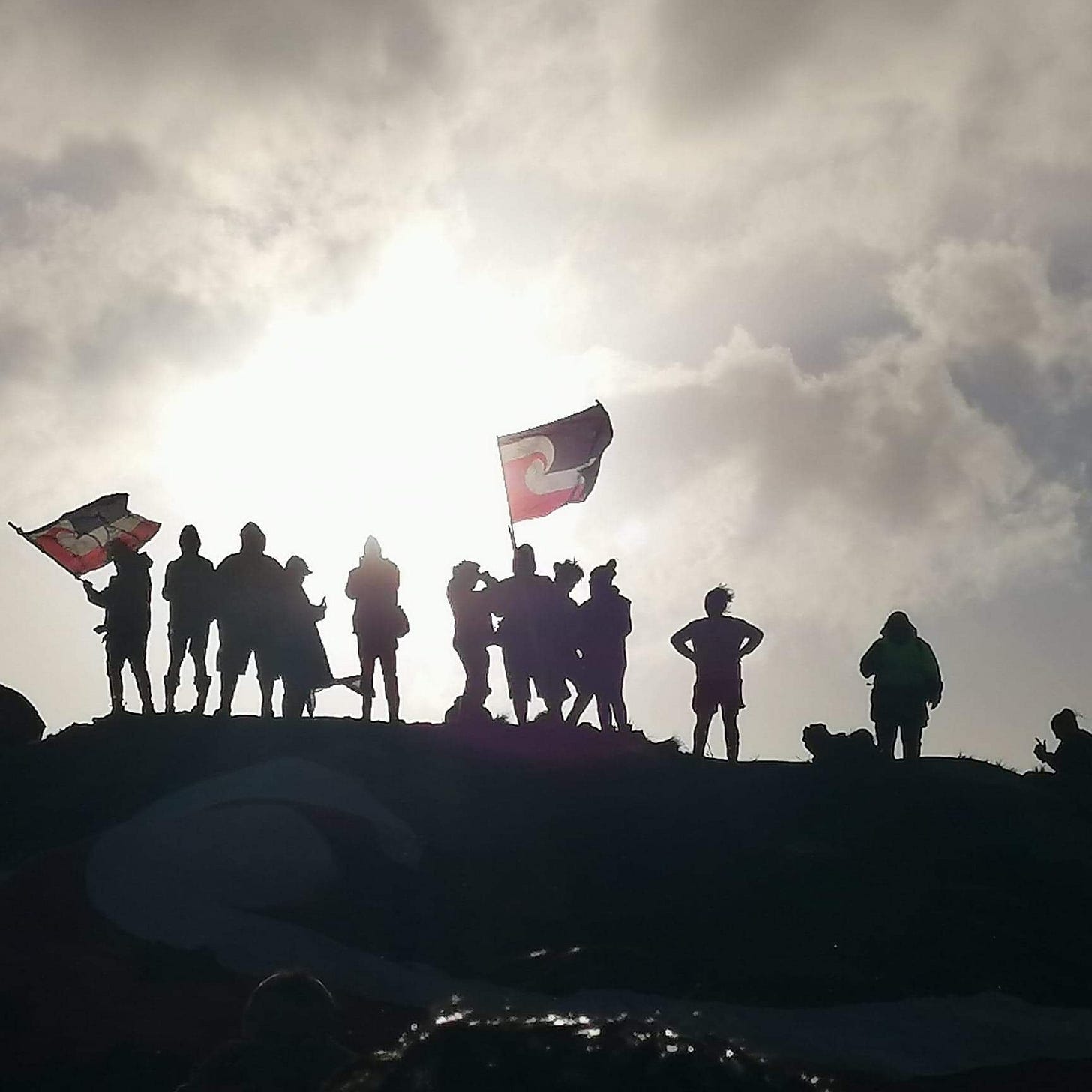Ihumātao: Fletcher's Ownership May be Legal, but is it Just? / Eugene Fuimaono

For the last three weeks I’ve been going out to Ihumātao on and off, mostly nights and weekends. I remember on my second day out there; we started making protest lines with our bodies to stop the police from continuing to break their promises to the haukainga.*
The day prior to this protest line, the police had made an agreement that they wouldn’t escort any Fletchers workers onto the site, but at 6:30am they did just that. Firstly I want to say, if you want the truth of the matter, you have to turn up. Read as much as you like, but also join the protest and make your decision there.
When my arms were linked to the two people next to me in the protest line, I introduced myself to these strangers. After some small talk, we all landed on the inevitable question, what brings you here? Turns out they were both from a protest group, they didn’t really know what was going down but they knew (somehow) that it was a justice issue.
As I follow the discourse between media outlets, social media personalities, and the plethora of randoms, I see people trying to side with one of two sides. The “legal side, and the “justice” side. Because the legal side has been well and truly covered by the media, the government, Fletchers, the Wallace family, and the iwi representative Warena, I’m going to roughly outline why this is truly a justice issue, and how the injustice of this whole situation can’t be fixed in a “legal” way. Understand that this is a HUGE summarization of historic legal events. Feel free to research in-depth yourself; it’s mostly on the internet if you care to dig.
1840 - Various Ngā Puhi Rangatira and others from around the country sign the Treaty of Waitangi. In regards to land, Queen Victoria guarantees fair land trade prices when trades happen, and that her representatives would oversee all transactions.
1840 - Land claims ordinance passed. This essentially nullifies the aforementioned guarantee, stating the land that Māori “used” was the only land they “owned”, making the government the legal “owners” of all the surplus land.
1846 - Native land ordinance passed. This made only ten people from a hapu the official “owners” of the land, regardless of whether they had mana to make decision or not. This essentially fragmented relationships due to the ability for settlers to negotiate with any random Māori person, whakapapa ties or not, and make a legal ground for transaction. Imagine some complete stranger walking in front of your house, and then them selling your house on your behalf, and netting all the profit. Same same.
1863 - New Zealand Settlements Act. Any Māori iwi/hapū seen to be in “rebellion” to the crown could, by force of arms, be evicted from their land which then became crown owned after confiscation. “Rebellion” was used to justify a number of different acts, from Māori people having small disagreements with legal crown claims, right up to the taking up of arms. It justified military force at all times, no matter how large or small the legal infraction. This law here is how Ihumātao was confiscated from its rightful owners. In the 1850’s various Tainui hapū had signed up with their Kingitanga movement, and in 1863 the Crown made a “legal” way to take all their land.
Many other oppressive and dismissive laws were made. Obviously we’re looking at a very narrow scope, but if we side with the law on this issue, how are we any different from the pharisees and the sadducees in scripture, upholding the law that oppresses the people for the sake of convenience? When the Treaty was crafted and signed, it was done in the presence and in the name of Ihowa/Jehovah/God, with the backing of the church. The other time this happens in scripture is the Gibeonites with Joshua (Feel free to read this for yourselves). Our history as Christians in this nation is long, from 1816, and if we continue to sit on the fence and do nothing when we have a chance to make good on the promises we made under God in the past (The Tiriti), how can we even hope to have a future in this nation? Where is our character? How can we be seen to be proponents for justice if we’re never on the side of it, preferring to side with the law, and its apparent safety. Sometimes, whānau, the law doesn’t uphold justice. Sometimes, justice is outside the law. Sometimes, if we want to uphold justice, we have to turn up to the thing that everyone else isn’t going to. All the time, if we stand together, we can change the outcome.
Eugene Fuimaono
*Haukainga: the people that live on the land, have whakapapa (ancestral ties) to the land and to one of the four marae connected to the land, different to the iwi ties to the whenua.



